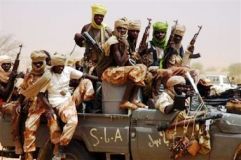Minawi rebel commanders say they may abandon Darfur peace
By Craig Timberg
Sept 14, 2006 (WASHINGTON) — Grai Commanders from the only rebel group that signed a peace accord in May for Sudan’s Darfur region are prepared to resume fighting if African Union peacekeeping troops leave as scheduled at month’s end and are not replaced by a United Nations force, according to more than a dozen senior rebel officials interviewed Wednesday.
 Rebel commanders predicted that such a resumption of combat would spell the end of Darfur’s tattered peace agreement and quickly escalate fighting to an intensity not seen since the early days of the conflict in 2003 and 2004.
Rebel commanders predicted that such a resumption of combat would spell the end of Darfur’s tattered peace agreement and quickly escalate fighting to an intensity not seen since the early days of the conflict in 2003 and 2004.
Their comments came as the African Union force of 7,000 is preparing to depart and as Sudanese President Omar Hassan al-Bashir is vigorously resisting pressure to allow a U.N. peacekeeping force of up to 22,500 to enter the country, threatening to attack them if they try. At a meeting scheduled for Sept. 18, officials of the 53-country African Union are to reconsider their decision to withdraw their soldiers
Abdelrahaman Abdallah, a commander of the rebel group’s military police, said that without a strong international force here, “the government will go back to its strategy, which is genocide, and inevitably we will go back to the bush.”[Passage omitted].
Since the peace accord was signed, rebel forces allied with Minnawi have been assisting in some government military operations, often providing crucial on-the-ground intelligence, but his commanders are increasingly reluctant to help.
The commanders interviewed Wednesday said they were so angry about recent attacks on civilians, including the bombing of villages by Antonov planes and rocket attacks by Mi-24 helicopter gunships, that they were prepared to abandon the peace deal. They said they would not be swayed even if Minnawi decided to keep his senior job with the government in the Sudanese capital, Khartoum.
His group, while having less political support than the most popular rebel group in Darfur, was widely regarded as the most potent fighting force among the rebels. It remains strong in Darfur’s southern and western areas.
“It’s not our desire to go back to the bush, but if there is no choice, we will go,” said rebel Gen. Ali Marmar, speaking in Graida, a rebel stronghold in South Darfur. Marmar said Minnawi would be replaced if he broke with the will of his commanders: “We have thousands like Minni.”
[Passage omitted].
AFRICAN UNION ROLE CRITICIZED
Combat has escalated sharply in recent days, with heavy bombing and clashes near the North Darfur town of Kutum and in an area north of Al Fasher where, according to African Union reports, government forces sustained heavy losses this week.
The African Union mission has been widely criticized by rebels, civilians and analysts as lethargic. The Janjaweed and government forces have repeatedly broken the cease-fire with impunity, even waving their guns at A.U. troops.
This week, the government seized a tanker full of African Union jet fuel in Al Fasher and used it to fill its own military aircraft, African Union sources said, speaking on condition their names not be published.
Investigations of major breaches of the cease-fire, meanwhile, have been stymied. That includes an incident Saturday in which villagers who had been attacked by Janjaweed militiamen two weeks earlier gathered near the ruins of their homes in South Darfur to speak to A.U. investigators set to arrive by helicopter.
But the helicopter turned back because of severe rain, and the Janjaweed attacked again, killing 18 of the survivors of the earlier assault and dispersing as many as 25,000 into a remote southern region far from humanitarian assistance or military protection, rebel leaders here said.
Minnawi complained to top African Union officials about the incident, and the group’s cease-fire commission twice scheduled investigative trips to the site of the atrocities, only to cancel them as commission members quarreled over the importance of the journey.
“The African Union is too weak to act,” Abdallah said.
Adoma Ahmed Haggar, a rebel field commander based here, said, “There are no signs of peace on the ground. The A.U. is not able. Our only hope is pinned on the United Nations.”
The U.N. Security Council approved the peacekeeping force for Darfur on Aug. 31, and intensive diplomatic pressure continues from the United States and other governments to persuade the Sudanese government to allow the force to enter the region.
Sudanese officials have called the U.N. proposal a violation of national sovereignty and an impediment to peace. Many outside analysts contend that the government wants to remove all outside observers from Darfur so it can pursue a military solution, including stepped-up attacks on civilians in areas where the rebels have popular support.
The government has also issued new restrictions against aid groups and journalists. Many humanitarian organizations have curbed their operations in the face of rising violence that has led to the deaths of 12 aid workers since the peace deal was signed. The U.N. World Food Program has reported that 355,000 residents of Darfur are going without food because it is not safe to reach them.
Rebel commanders say they will not tolerate such attacks and deprivations much longer. Minnawi’s group has about 50 senior commanders. Asked how many would resume fighting if an effective international force did not arrive soon, Marmar said, “All of them.”
(The Washington Post)
